A study of public attitudes about farm animal welfare suggests that, while a majority of the public think Australian farmers do a good job, consumer attitudes are shifting and Australian agriculture has work to do to ensure its commitment to high animal welfare standards is understood.
The report – Australia’s Shifting Mindset on Farm Animal Welfare – was commissioned by the Department of Agriculture and Water Resources to identify public expectations of farm animal welfare and to help the department understand whether current regulations are perceived to be sufficient.
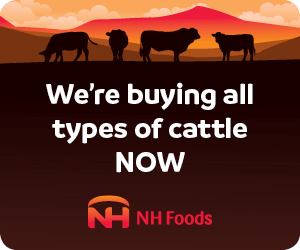 The research underpinning the report was conducted by independent consultancy firm Futureye and included a national survey of 1521 people, randomised across Australia to provide a representative sample, and several focus groups.
The research underpinning the report was conducted by independent consultancy firm Futureye and included a national survey of 1521 people, randomised across Australia to provide a representative sample, and several focus groups.
The research showed, not suprisingly, that most Australians are concerned about the welfare of farm animals, but the degree of their concen varies.
27 percent of respondents ranked farm animal welfare as an issue of “serious” concern, 44pc as an issue of “moderate” concern and 24pc as an issue of “minor” concern. while 5 percent felt it wasn’t an issue at all.
Of the 1531 survey respondents, 91 percent indicated they wanted to see at least some reform to existing regulations overseeing farm animal welfare – of this 40pc wanted “significant” reform, 35pc “slight” reform and 16pc “some kind” of reform, while 10pc thought current regulation was adequate.
Of those seeking reform, various actions for improvement for the Department to consider included:
- a minimum standard for farm animal welfare set by government;
- incentivising farmers for good animal welfare;
- better education of the public about agricultural practices in terms of awareness-raising;
- standardisation of product labels such as free-range; and
- whistle blowing about animal welfare on farms should be encouraged
On the question of whether survey respondents felt farmers cared about animal welfare. 66 percent agreed that they did.
Only 7 percent disagreed, indicating a majority of the public do not share the views of animal activists who continue to campaign for an end to animal agriculture and raising livestock for food.
But at the same time, a reasonably large amount – 22 percent – were ‘ambivalent’ or undecided, while 3pc had no opinion.
51pc agreed or strongly agreed that welfare of beef cattle in Australia “is generally good”, 18pc disagreed or strongly disagreed, and 31pc basically haven’t made up their mind.
The numbers for sheep were similar (see chart at top of page).
Are activists actions ‘too extreme’?
When asked if they believed the actions and campaigns of animal welfare activists “are too extreme”, 43pc believed they were, while 25pc believed their actions were not too extreme. 28pc were ambivalent, and 4pc no opinion. (It is worth noting this survey was conducted in 2018, before a wave of more aggressive activism involving farm, saleyard and abattoir invasions and city streets blockades occurred around the country).
Asked if they believed it was unfair for farm animals to be bred and killed for animal consumption, 37pc of respondents believed it was unfair. A similar amount, 35pc, disagreed that it was unfair, while 28pc were undecided.
A selection of answers on more specific topics of included:
Should live export be banned? 60pc said yes, 13pc said no, 27pc undecided.
Should independently monitored CCTV be installed in slaughterhouses? 74pc said yes, 5pc said no, 21pc undecided
Is performing painful procedures without pain relief acceptable? 80pc said no, 3pc yes, 17pc undecided.
More detail in the chart below:
Societal expectations about farm animal welfare are changing
One of the key messages from the report is that societal expectations around animal welfare have changed significantly and are continually evolving.
Survey respondents who believed animals have sentience and capabilities (ie awareness of bodily sensations such as pain, awareness of heat, cold, hunger, the capacity to experience stress, joy and pleasure, awareness of their surroundings) and believed they were well informed about agriculture were likely to have high alignment with activist statements relating to animal rights and freedoms.
The report said the public is most concerned about practices that are depicted graphically in the media, are viewed as unnecessary and that do not seem to provide benefit to the animal.
Of specific relevance to the Department as the regulator, the report also showed that there is a gap between what the public expects of the regulatory, and the regulator’s powers in reality.
Most people see the federal government as the key authority responsible for regulating farm animal welfare, even though the Federal Government lacked constitutional power to create reform.
The “Department of Agriculture and Water Resources currently has very limited powers over farm animal welfare,” the report said.
“This has the potential to result in outrage, particularly if the community sees the Government as not responding to concerns and expectations.”
Futureye recommended the Department adopt “outrage mitigation strategies” to address concerns about farm animal welfare and its role in regulating this issue.
The report suggested that most of the distrust that exists at public level of the industry and government stems from a perception that there is a lack of transparency and that certain information may be kept hidden intentionally, or deliberately obscured.
One solution discussed by focus group participants was the development of a trusted certification process and label that can help consumers differentiate animal products that have good animal welfare standards from poor ones.
Focus groups suggested the public is willing to pay more but only if they feel they can trust the products really ensure better animal welfare standards, and if the industry is transparent about it practices.
Practices that could be perceived to have some benefit to the animal are met with less concern than those that are seen to cause unnecessary pain.
The report also indicated the public has an appreciation that the low price of animal products can constrain a producer’s ability to maintain good animal welfare standards and the government’s ability to enforce them. Issues such as poor animal welfare in live export were of highest concern (57pc of respondents), followed by concerns over low income for farmers and farm workers (47pc).
Focus group discussions revealed many respondents were concerned that the Department of Agriculture and Water Resources has a conflict of interest when both supporting the agricultural industry and promoting good animal welfare standards.
Snapshots for further findings included:
The Australian Government takes welfare of all animals seriously:
39pc agree
24pc disagree
32pc ambivalent
5pc no opinion
The Australian Government understands and shares the concerns of the community about the welfare of animals
41pc agree
22pc disagree
33pc ambivalent
5pc no opinion
The Australian Government is working with the livestock industry to promote animal welfare
46pc agree
13pc disagree
35pc ambivalent
6pc no opinion
Farmers care about animal welfare
66pc agree
7pc disagree
23pc ambivalent
3pc no opinion

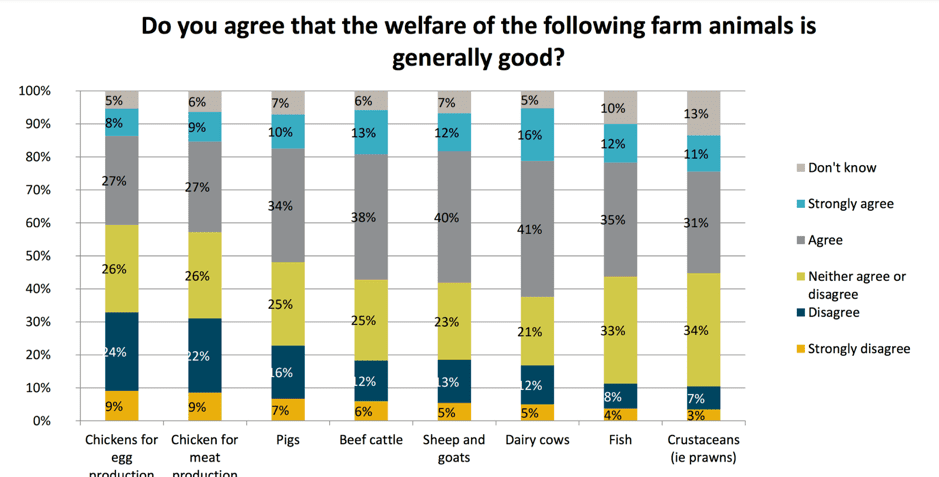
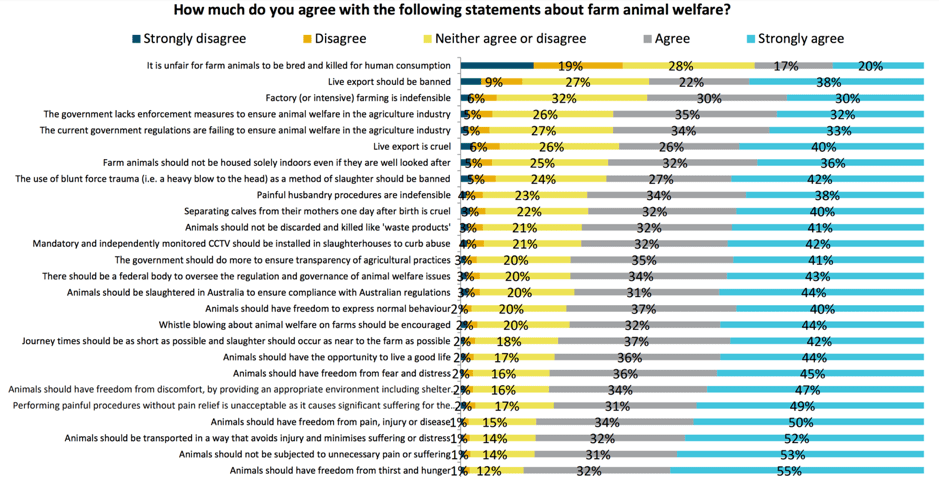
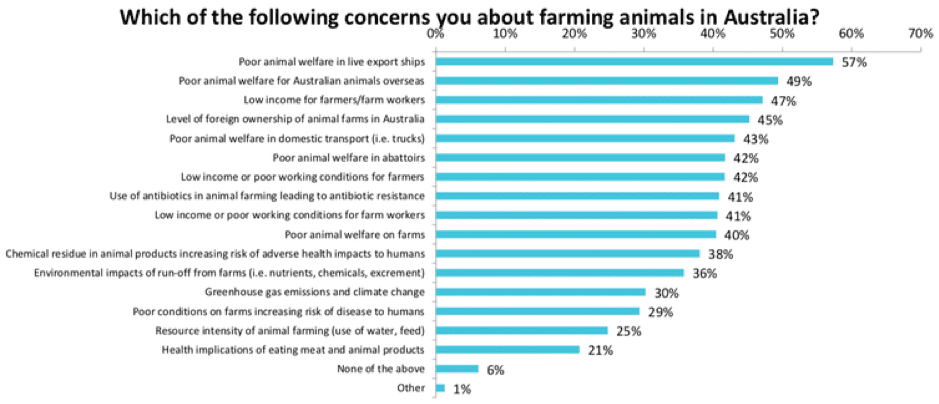
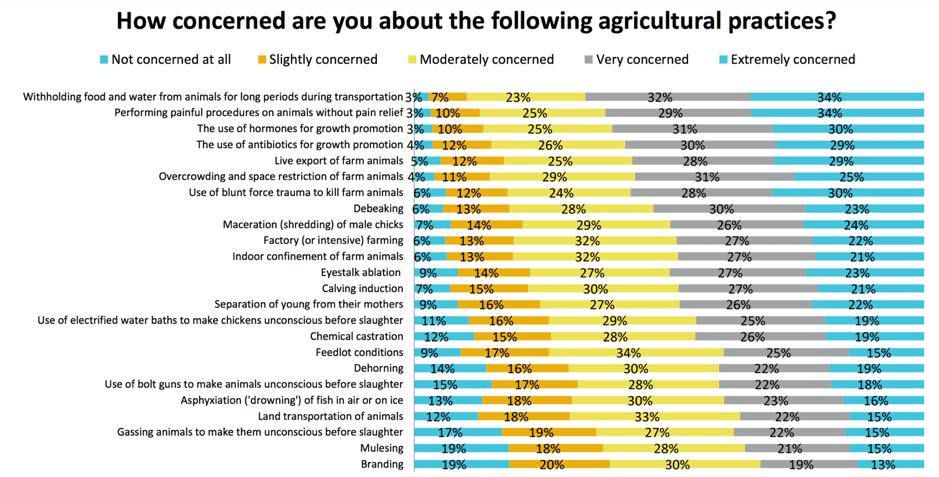
Be wise for the industry to catch on that its not just avocado munching vegans against Live Export. Many farmers are as well. And like any industry there’s good and bad farmers and it’s the bad ones giving all a bad name.
Is it ethical to have slaughter practices in our abattoirs that aren’t firstly and foremostly based on animal welfare?
The vast majority of the people surveyed would have no idea what animal welfare practises are undertaken and why. Their information comes from social media and television. Having a better informed society would go a long way to alleviating the public’s concerns about animal welfare in agriculture.
I hope they did not use the pollsters who predicted last Saturday’s election to determine the nations stance on agriculture animal welfare.